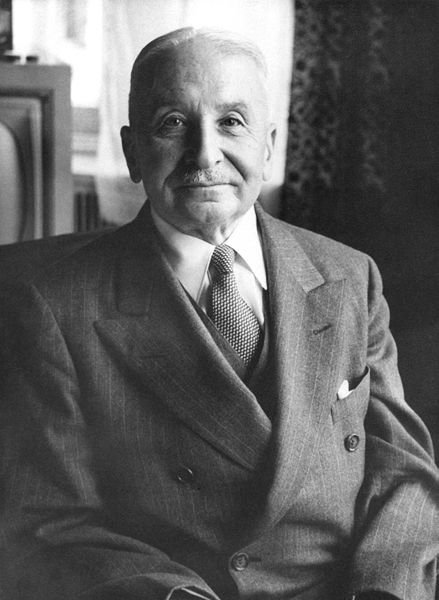How Digital Money Can Pave the Way For a Free Society

The Austrian School of Economics has proven that state interventions into the economy have harmful long-term effects leading to an impoverishment of society. As Hayek pointed out in his book The Road to Serfdom, state interventions tend to gain their own, uncontrollable momentum. The undesired side effects of a first intervention inevitably lead to a second, ostensibly better one. Naturally, this ‘better’ solution generates even more undesired side effects, and the chain of state intervention adds another link. This vicious circle will inevitably lead to a totalitarian dictatorship if it is not consciously broken.
Every centralized institution suffers from the basic problem of a “pretense of knowledge,” as Hayek calls it. It is virtually impossible for a centralized organization to dispose of all information necessary to serve the needs and desires of millions of people. A much more powerful alternative that leads to more wealth and welfare than a centralized system is a spontaneous order such as a market which co-emerges from the many voluntary decisions of independent individuals.

Ludwig von Mises (Source: WikiCommons)
The Libertarian View of the State
Libertarian political philosophy, which is deeply connected to the Austrian School of Economics, has a critical eye turned towards the state. As Ludwig von Mises famously opined:
“The state is an apparatus of force and coercion. The essence of the state’s activity is to use force or threaten to use it in order to make people behave in a different way than they would behave voluntarily.”
Libertarian-minded people fascinated by Bitcoin and the Blockchain see these technologies as a chance to build a better and freer society based on voluntary action rather than on force and coercion. They view the state in its current form as obsolete, arguing that it can be replaced by new methods of societal organization.

Bushman family in Africa (Source: Pixabay)
From Tribes to States
The nation-state we know today is a relatively young phenomenon. For the better part of human history, humans lived together in small groups, like tribes or clans. In these small groups members were all familiar with one another, making it relatively easy to solve problems and come to a consensus. This was no longer possible after the introduction of agriculture, when people started to live in bigger cities. Centralized structures of command and control were established, with a king-figure and a small nobility caste at the top. This seemed to be the only way to organize a society of a certain size.
But even the big empires we remember from our history classes were relatively loose, decentralized formations if we compare them to the states of today. Kings, emperors and pharaohs demanded tributes and soldiers from local rulers, but they had little impact on people’s daily lives.
The Industrial Revolution brought a dramatic increase in the level of government centralization. People were seen as small cogs in the giant machine of the state. This culminated in the totalitarian dictatorships of the 20th century that controlled each aspect of a citizen’s life.
The modern welfare state appears less aggressive than these regimes, but while claiming to create “social justice” it also invades people’s lives and creates dependency. In reality, the so-called social state makes people more anti-social. The natural solidarity that we have deteriorates when the state takes over. If you’re already forced to pay high taxes to a government that claims to be responsible for the “common good,” why provide for your neighbors?
Unfortunately, the state is as incapable in running schools, hospitals and social security systems as it is in producing cars, cell phones or computers. The insights of the Austrian School about the shortcomings of a centralized bureaucracy are equally true for education, health and social security. Leaving these important areas to the state is not a good idea.

Forms of networks (source: WikiCommons)
A Trend Towards Decentralization
While past advancements like the agricultural and the Industrial Revolution made society more centralized and hierarchical, new technologies like the Internet and the Blockchain have caused an opposing trend towards decentralization.
The Internet has decentralized communication. The days are over when one was dependent on a few sources of easily censorable information. We now have access to millions of information sources from all around the world. At hardly any cost we can communicate directly with friends living anywhere on the planet.
Every blogger or editor of a video podcast has the potential to reach a massive audience, all without the need for a government license or significant investment capital. The power of states and big media corporations has withered, while the power of the individual has increased.
Bitcoin and Blockchain technology are supercharging this trend. By using a digital payment system like Bitcoin, everyone can take part in the global economy without the need for a bank account or credit card. This opens up opportunities for people in developing countries, who can now offer their skills to the world. All they need to receive payments is Internet access, usually on a cheap smartphone.
Direct economic relations between people are now possible. Before, high fees for international transactions kept this from being a viable solution. Banks and credit card companies are no longer needed as gatekeepers, and the state no longer has power to control transactions or freeze accounts.
This became obvious when the US government forced Visa, Mastercard and PayPal to freeze all accounts associated with Wikileaks. Julian Assange’s popular whistleblower website subsequently started using Bitcoin in June 2011, bringing untold amounts of attention to the new digital currency.
Decentralized apps based on Blockchain technology give even more power to the individual and put the very existence of central institutions like the state into question. When you do not need government services to issue a passport, to register real estate or to resolve a legal dispute, what is the state good for at all?

Murray N. Rothbard (source: WikiCommons)
Police and Jurisdiction
One of the few areas in which also die-hard libertarians consider coercion necessary is the fight against crime. Libertarians would only consider a deed a crime if there were a real victim. Laws against the “dispraise of state symbols” or the “disturbance of public order” are therefore not justified, as they do not protect the life, liberty or property of individual human beings. Laws which dictate what people may eat, drink or smoke are equally invalid according to the libertarian view, as everyone is responsible for his or her own body.
Avoiding crimes like murder, robbery or theft is obviously not possible without using force. A potential murderer won’t be stopped by an empathic talk. Although the state does not have the best track record in stopping crime, many libertarians still consider jurisdiction and law enforcement to be a domain of the state.
Radical thinkers like Murray N. Rothbard have developed alternative models showing how even these state functions could be handled by private agencies competing against one another. Citizens would commission companies to provide security and solve legal disputes. Rothbard claims that an apparatus of police and jurisdiction that is funded by taxes has no real incentive for reducing crime, as it justifies their very existence. Private security companies would be paid for successfully avoiding crimes. The lower the crime rate, the higher their profit. So there would be a competition for the best methods to reduce crime, rather than a race for higher budgets funded by taxes.
Flaws of the State
There are lots of rather academic discussions among libertarians about whether the state should be abolished and replaced by private law and competition, or whether it should be limited to core areas and controlled by a system of checks and balances. In any case, we are far away from a free society that works with a limited or non-existent state. In many countries the state still dominates a huge part of the economy. In my home country of Germany, about 70% of an average worker’s income goes through direct and indirect taxes and compulsory social security contributions to the government apparatus.
Bitcoin and Austrian Economics
Ludwig Erhard, the architect of the German “Economic Miracle” of the 1950s and 60s, warned in vain against the cancer-like growth of the welfare state:
“People always have to pay dear for so-called ‘welfare,’ as no state can give more to its citizens than what he has taken away from them beforehand – and you have to deduct the costs of a welfare bureaucracy that inevitably degenerates into an end in itself.”
Our current system has an essential problem. If someone has the privilege to spend other people’s taxes, he will naturally not act as responsibly as he would with his own money. This inevitably leads to waste, mismanagement and growing debts, as you can see in nearly all state-driven matters. Funding activities by coerced taxes has proven to be malfunctioning.
Even more harmful is the government’s monopoly on money. Very few people are aware of the damage done on society by subtle inflation and the Cantillon effect, which benefits the ones close to the source of money at the expense of everyone else.
End the Money Monopoly!
A first and crucial step on the way to a free society is the reform of the monetary system. The government’s monopoly on money and all “legal tender” laws have to be abolished. State currencies such as dollar, euro or yuan may continue to exist, but there needs to be a fair competition for all currencies. Bitcoin and other decentralized currencies must have the same chances as money issued by the state or by private companies.
As in every fair competition, the best products will win. It is likely that people will continue to use the money they know by habit for a while. But in the long run, the inferiority of state-issued, unbacked money compared to currencies backed by gold or based on Blockchain technology will become so obvious that it will lose its importance.
Competition of Currencies
The competition for the best currency has already started. Besides Bitcoin, there are a few hundred digital coins that work by similar principles. Bitcoin has a huge and growing lead over competitors such as Litecoin, Peercoin or Dash because of its early start and network effects that benefit the leader of the pack. But there is no guarantee that this will stay like that forever. Maybe another digital currency will prove itself so superior to Bitcoin that it will outperform Satoshi’s creation. Maybe a gold-backed currency or one that is backed by the shares of a company will win. The great thing about a competition that is fair and not distorted by state-granted privileges for some players: the best one will win. Or, the best ones, as there may as well be several winners.
Maybe some currencies will be used mostly for day-to-day payments, others for savings, others for international transactions. Bitcoin has opened the competition, and we should be grateful for Satoshi Nakamoto for making this possible. His invention made many people investigate and question the fiat money system and search for better alternatives.

The V symbol of voluntarism
The Virtues of Voluntariness
If the state loses its monopoly on the money supply, it can no longer fund its activities by printing money and piling up debts. Using force to collect taxes will also be less and less effective as the citizens’ incomes are no longer traceable thanks to encryption technologies. The old method of extorting money by force from people without letting them decide how to spend it becomes obsolete. Voluntary payments will replace coerced taxes.
Many activities that were organized by the state so far can be taken over by private enterprises, either profit-oriented or not-for-profit ones. Only those tasks that are probably better executed by the state will remain in its domain, but they need to be funded by voluntary donations. One could imagine an individual Bitcoin address for every task. By sending money to a specific address, citizens will decide which tasks are the most important ones for them. By using multiple signatures and smart contracts, they will remain in control of their funds. Their money will only be paid out if well-defined criteria are fulfilled.
People are interested in things like museums, public libraries and public transport, so they will continue to exist in a system that is based on voluntary payments. The difference is, that people can decide by themselves on what to spend their money rather than delegate the decisions to bureaucrats and politicians.
Civil associations, foundations and cooperative societies will take over most of the activities that are handled by government agencies today. Instead of voting for politicians every four years, we will use Blockchain technology to come to a consensus about critical questions, even with people we have never met.
These decisions will not resemble today’s referendums, as only those who actively support a project may take part in a decision, either by financial contributions or by voluntary work. A “dictatorship of the majority” which forces a minority to pay for the others is no longer possible.
The democracy of the future will be much closer to the Greek original. It is no coincidence that the Greek word Agora describes not only the central square in a city which was used for elections and referendums, but also means market. Thanks to Blockchain technology, human cooperation will again be based on individual decisions and self-responsibility, as you can observe them on a truly free market.
It’s the Technology, Stupid!
Is this vision of a free society realizable? It is up to us. For the first time in history, technologies like cryptography and the Blockchain make it possible. Big leaps in civilization were usually triggered by new technologies – be it the wheel, the printing press, the steam engine or the computer. Most people were not even aware of the giant disruption they were experiencing, as new inventions usually take quite a while to come into popular use. After having reached a tipping g point, it is hard to remember how the world could have ever worked without them.
This will be similar in the case of decentralized money. We are still in its very early stage, in which most Bitcoin users are idealists who dream of a better world without banks and governments. But most people do not think like that. They do not care for cryptography, the monetary system or an economic school from ancient Austria. But they would use a new technology if it saves them time and money.
As we have seen, Blockchain technology has the potential to provide this. Many services that required significant time and effort in the old world become faster, cheaper and more secure if realized with Blockchain technology, be it worldwide payments, smart contracts, the transfer of assets and many other things.
Now it is up to entrepreneurs to create useful and user-friendly products and to market them efficiently. In most cases, one would not even know that they are based on Bitcoin and Blockchain technology. People would not use them because they want to change the world, but because they serve their daily needs in a more economic way. So if you really want to do something for a free society, you do not have to found a “Bitcoin Party” or start a University for Austrian Econom ics. The best way to make the world a better place is to create Blockchain based products that wow people and are really useful for them.

A honey badger at Espacio Bitcoin Buenos Aires
The Honeybadger of Money
At the moment it is not easy to be a Bitcoin or Blockchain startup. You have to cope with all kinds of regulatory issues, pay expensive lawyers and spend a lot of time talking to clueless regulators. In some countries it is nearly impossible to get a bank account if you do any kind of Bitcoin business. Some governments have banned Bitcoins, but most of them try to apply rules to it that were made for the old financial system. This doesn’t make much sense, as the old rules were only necessary because you had to entrust third parties like banks or credit card companies. But Bitcoin works with out trust in third parties. The software protocol itself already contains the regulation. Additional regulation would only stifle innovation and scare away companies into other jurisdictions.
A good example of the damage that can be done by regulation is the Red Flag Act of 1865, which regulated locomotives and automobiles in Britain. It determined a maximum speed of four miles per hour and a minimal staff of three people to steer any car: a driver, a mechanic and a third guy who would walk in front of the vehicle with a red flag to warn other road users. Only when this absurd rule was repealed in 1896 could a car industry develop in Britain. In unregulated Germany, many car companies were already flourishing. The British car industry could never catch up with this lead. Today, most of the originally British car brands and factories belong to German companies.
The way Bitcoin is handled today reminds of the attitude many people had towards the Internet in the early 90s, when it was first gaining popularity. If you had anything to do with it, people would sneer at you like you were some weird computer nerd. Big companies like AOL or Deutsche Telekom had their own online services. They did not consider the Internet to be a serious competitor, but a strange playground for geeks.
It was a long way from the early days of the Internet in the late 60s and early 70s, when it was only known to a handful of academics, to the World Wide Web of today with its billions of users. It took the Internet more than 30 years to reach mass adaptation. Fortunately its development was not stifled by regulation. Even totalitarian regimes do not succeed in completely blocking the net. They likely regret that the Internet was not forbidden in the early days, as it is now impossible to roll it back. Some publishing houses and record companies who went out of business may have the same regrets. But I assume that most people are happy about the Internet and could not imagine a world without it.
Similarly, some banks and government may hope that decentralized money disappears again, but the odds are low. Bitcoin has been declared “dead” numerous times: the website www.bitcoinobituaries.com counts 111 death notices as of today. But Bitcoin has always come back. Backlashes like hacked exchanges or drastic price drops have not killed Bitcoin, quite the contrary, they have made it even more persistent. Some call it the “honey badger of money,” as the honey badger (mellivora capensis) has an extremely thick skin that even bears snake bites. It is such a fearless fighter that it takes on lions and hyenas. Bitcoin users like this attitude and wear t-shirts and buttons sporting the “badass” animal.
Even if Bitcoin itself fails for whatever reason – the genie is out of the bottle. Many potential successors like Litecoin, Peercoin, Dash or Steem stand in line to take over. Blockchain technology has proven to be robust and reliable. Even big players of the financial industry start using it. And as we have seen, it can be utilized for many other things than payments.
We should get ready for a world without a state monopoly on money, maybe a world without monopolies and states at all. Let’s make the best of it!
This is the final chapter of my book A Beginner's Guide to Bitcoin and Austrian Economics. You can buy it on Amazon in English or German (printed or e-book).
Other chapters available on Steemit:
Why The Money Monopoly is Evil
The Austrian Way - A Short Introduction Into the Austrian School of Economics
What a great article, thanks Aaron!
It also inspired me to write this :-)
Turn your STEEM into physical Gold!
https://steemit.com/steemit/@fabio/turn-your-steem-into-physical-gold
Thanks this was a great read, I will be re-reading it a few times to digest the points well made.
Excellent tie in with the monkeysphere
@aaronkoenig - very good summary of my thoughts) TOtally agree with your last conclusion on BitCOin, it may fail but a concept that money is created by labour and not by money as it is now should be the driver for the next decades!
True points all around. My favorite fragment is on the existence of the police.
I see the police as bureaucrats with weapons. All officials are bureaucrats. Why is that important to illuminate? Because bureaucrats are nothing more than middle men. Once we use the full utilization of technology we can kill the cancerous middle management class.
Too many people are fighting against the sign of times. Against the decentralization of power. But why? It's only natural. The Second Law of Thermodynamics naturally states for inexorable entropy.
Great article! It's good to see more and more people talking about Austrian economics.
Brilliant write up @aaronkoenig. Wonderfully written and referenced. I will be buying the whole book!
Resteemed!
id always like to use precious metals ^_^ i like options